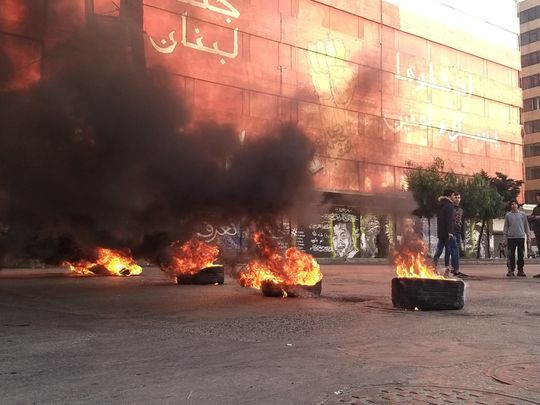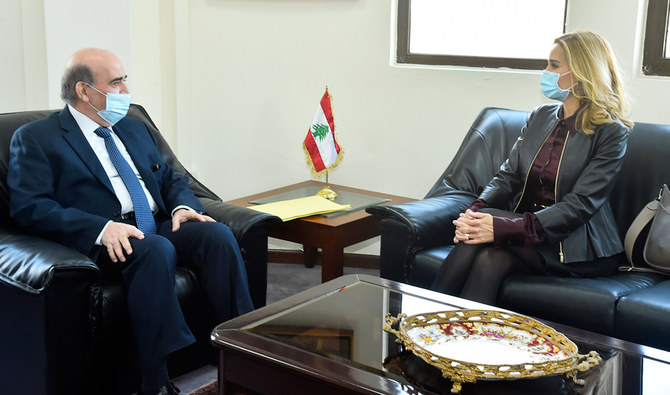
by arabnews.com -- NAJIA HOUSSARI -- BEIRUT: The closure and curfew period in Lebanon has been extended for two more weeks to contain the spread of the coronavirus disease (COVID-19), prompting people in Tripoli, Beirut, and Sidon to take to the streets. The protests were spontaneous, considering that the neighborhoods from which they started are poor, where the residents work for daily wages. The Minister of Social Affairs and Tourism in the caretaker government Ramzi Musharrafieh said on Tuesday that “230,000 families in Lebanon benefit from aid and have been receiving 400,000 Lebanese pounds ($263) per month since the beginning of the crisis.” He added that “25 percent of the Lebanese people do not need aid.” Hundreds of people took to the streets in Tripoli, Sidon, and Beirut to denounce the suspension of the economy and the failure to provide people with alternatives.
One of the protesters said: “Contracting COVID-19 and dying of it is easier than having my family and myself starve to death.” Protesters in Tripoli took to Al-Nour Square on Monday after days of expressing their impatience and protesting outside the houses of the city’s officials. One of the protesters said: “COVID-19 does not scare us. We cannot tolerate this life of humiliation anymore. The officials in power have starved and robbed us.” The protesters clashed with the security forces — the army and the Internal Security Forces — hurling stones and water bottles at them. Their chants demanded financial compensation for the poorest families, who have not been able to work for two weeks and must wait a further two weeks before they can return to their jobs, resulting in a whole month without any financial income.
The pandemic has taken its toll on shopping destinations worldwide and the latest chain to shutter is Godiva by the end of …

by english.aawsat.com -- Maronite Patriarch Beshara al-Rahi stressed Sunday that the Lebanese Constitution was written to be respected by officials and not to become a source of tension. “The Constitution has been created to be implemented and not to be a cause of dispute,” he said during Sunday’s mass service in Bkirki. It was also written “to be a source of agreement and not a source of disagreement.” His statement came in light of a recent political dispute between President Michel Aoun and Prime Minister-designate Saad Hariri on the President’s role in forming the new government.
Aoun says the President has a constitutional right to approve the names of the proposed ministers before signing its decree, while Hariri accuses the President of rejecting, without any explanation, the lineups he has been presenting him. Rahi reminded politicians of "Article D" of the Constitution, saying the people are the source of authority and sovereignty and therefore, shall exercise these powers through the constitutional institutions. “Don’t you fear God, the people and the court of conscience and history? How can unyielding political positions - that are destructive for the state as an entity and constitutional institutions - persist and under what national conscience and under what justification?”

By NAJIA HOUSSARI -- arabnews.com -- BEIRUT: Lebanon’s foreign minister, Charbel Wehbe, demanded the absolute secrecy of the investigation into “suspicions of money laundering and embezzlement by the Banque du Liban,” following a Swiss request for assistance from the Lebanese judiciary. Wehbe met with the Swiss ambassador to Beirut, Monika Schmutz Kirgoz, on Monday, who refused to comment on the matter, saying that the probe was a matter that the Swiss minister of justice and the attorney general were dealing with, adding that the Swiss attorney general was the one who requested judicial assistance. Wehbe said: “Despite the importance of this matter to the Lebanese public, absolute secrecy is required in response to what is being circulated through Lebanese media regarding this case.”
Wehbe called on the media to “report the news as it is, without interpretations, additions, or switching words around.” He also said: “I hope that the Lebanese judiciary will have absolute freedom to make a statement and take the appropriate decision in this regard.” The Lebanese judiciary informed the governor of the Banque du Liban, Riad Salameh, last week that he is expected to present his testimony either before the attorney general in Switzerland or before a Swiss judicial delegation at the country’s embassy in Lebanon. Salameh denied he had made any transfers from the accounts of the Banque du Liban or from its budgets, and expressed his readiness to go to Switzerland to present his testimony. He said in a statement on Monday: “All reports about large transfers reported by some media outlets are very exaggerated and have nothing to do with reality. They aim to systematically tarnish the image of the central bank and its governor.”
Khazen History


Historical Feature:
Churches and Monasteries of the Khazen family

St. Anthony of Padua Church in Ballouneh
Mar Abda Church in Bakaatit Kanaan
Saint Michael Church in Bkaatouta
Saint Therese Church in Qolayaat
Saint Simeon Stylites (مار سمعان العامودي) Church In Ajaltoun
Virgin Mary Church (سيدة المعونات) in Sheilé
Assumption of Mary Church in Ballouneh
1 - The sword of the Maronite Prince
2 - LES KHAZEN CONSULS DE FRANCE
3 - LES MARONITES & LES KHAZEN
4 - LES MAAN & LES KHAZEN
5 - ORIGINE DE LA FAMILLE
Population Movements to Keserwan - The Khazens and The Maans
ما جاء عن الثورة في المقاطعة الكسروانية
ثورة أهالي كسروان على المشايخ الخوازنة وأسبابها
Origins of the "Prince of Maronite" Title
Growing diversity: the Khazin sheiks and the clergy in the first decades of the 18th century
Historical Members:
Barbar Beik El Khazen [English]
Patriach Toubia Kaiss El Khazen(Biography & Life Part1 Part2) (Arabic)
Patriach Youssef Dargham El Khazen (Cont'd)
Cheikh Bishara Jafal El Khazen
Patriarch Youssef Raji El Khazen
The Martyrs Cheikh Philippe & Cheikh Farid El Khazen
Cheikh Nawfal El Khazen (Consul De France)
Cheikh Hossun El Khazen (Consul De France)
Cheikh Abou-Nawfal El Khazen (Consul De France)
Cheikh Francis Abee Nader & his son Yousef
Cheikh Abou-Kanso El Khazen (Consul De France)
Cheikh Abou Nader El Khazen
Cheikh Chafic El Khazen
Cheikh Keserwan El Khazen
Cheikh Serhal El Khazen [English]
Cheikh Rafiq El Khazen [English]
Cheikh Hanna El Khazen
Cheikha Arzi El Khazen
Marie El Khazen